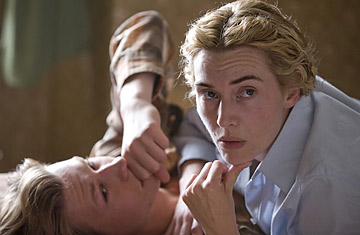
Kate Winslet in The Reader
The Reader; Revolutionary Road
She can do almost anything, be almost anyone, as long as the code word is danger. A ticket to a Kate Winslet movie pays for a trip into uncharted lands and toxic emotions. She doesn't play weak; she's not in it for the fun. She looks over the edge, leaps in and takes you down with her.
This English actress, 33, has been a force for sizzle and discomfort since she was a teenager, in Peter Jackson's Heavenly Creatures, in which she propelled another girl onto a murderous fantasy ride. In Titanic, her biggest hit and least jangling role, she was the aristocratic love and death of poor boy Leonardo DiCaprio. Jude, Iris, Eternal Sunshine of the Spotless Mind: they all cast her as the dominant female force. That suited Winslet, since her intelligence as an actress is essentially critical; it gives an erotic taunt and charge to any encounter. Winslet women usually proceed from an enveloping restlessness, a resentment of the status quo. This life isn't enough; let's stir things up, till death do us part.
Reunited with DiCaprio in Revolutionary Road, she's the wife who wants to flee suburbia to rekindle a bohemian past. She speaks in cheerful midcentury modulations, but you detect the whisper of murder under her breath. Why can't her husband hear her pleas, which are also threats? Because he's wrapped in career anomie. He ignores her at his peril.
In The Reader, Winslet's Hanna Schmitz, survivor and handmaiden of the Third Reich, can't escape or erase the past — not even through the carnal, almost feral intensity of a brief affair she has with a teenage boy, Michael (David Kross), in 1958. If Hanna is the sum of what she's done, then she is satanic. If she is the repository of Michael's and the moviegoer's fascination, then she's saved from eternal infamy. Winslet puts across all of Hanna's misery, moral blind spots and allure in a performance of precise and desperate passion. Come fly with me, her laser stare says — to hell.